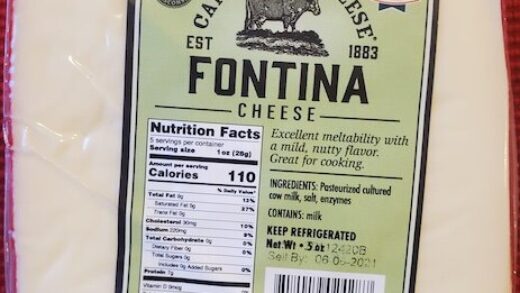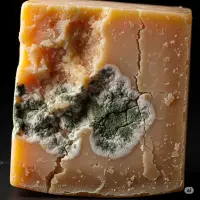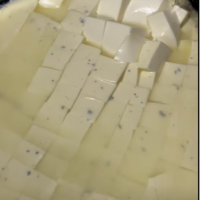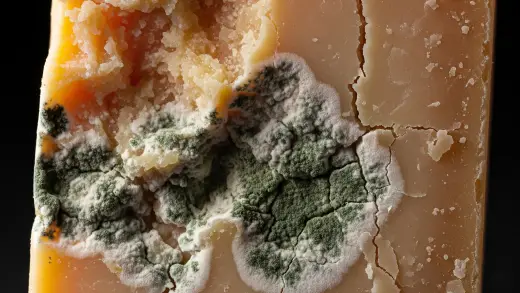Gouda cheese can have a slightly bitter taste, which can vary depending on its age. The bitterness is mild and part of Gouda’s flavor profile, adding complexity to the cheese.
Introduction on Is Gouda Cheese Bitter
Gouda is a widely popular cheese known for its rich, creamy texture and sweet, nutty taste. It originates from the Netherlands and is made from cow’s milk. The aging process contributes to the development of its distinct flavor, with younger Gouda being milder and creamier, while older Goudas can have a sharper and more pronounced taste.
Whether you enjoy it on its own, paired with fruits and nuts, or melted on a sandwich, Gouda offers a versatile and delectable addition to any dish or cheese board.
Gouda Cheese Flavor Profile
Gouda cheese is a famous Dutch cheese known for its special taste and smooth feel. The taste of Gouda can change depending on how long it’s aged. Here are some basic things to know:
Young Gouda is Mild and Creamy
When Gouda is young, it’s aged for a few weeks to a few months. It has a mild, creamy, and slightly sweet flavor. It’s smooth and a bit soft.
Older Gouda is Nutty and Caramelized
As Gouda gets older (aged for several months to a few years), it gets a richer taste. It becomes nutty and caramelized, and you might notice crunchy bits.
Butterscotch and Hazelnut Flavors
Aged Gouda can have flavors like butterscotch and hazelnut, giving it a sweet and savory mix. The longer it ages, the stronger these tastes get.
A Bit Tangy
Especially in younger Gouda, there’s a small tangy taste that adds a refreshing kick.
Smooth and Creamy Feel
Gouda is known for being smooth and creamy. Even when it’s aged, it keeps some creaminess, though it gets firmer.
Useful in Many Ways
Gouda is a flexible cheese. You can enjoy it by itself or in different dishes. It melts nicely, so it’s good for things like sandwiches and hot meals.
Just remember, everyone likes different things, and the taste of Gouda can change based on how it’s made, what the cows eat, and where it comes from. Whether you eat it on its own, in sandwiches, or melted in recipes, Gouda is a popular choice for cheese lovers.
Is Aged Gouda Less Bitter?
Gouda cheese is renowned for its rich and savory flavor profile, but some enthusiasts find its taste to be on the bitter side. A common question that arises is whether aged Gouda is less bitter. To answer this, we need to delve into the aging process of Gouda cheese and the effects it has on its taste over time.
The Aging Process Of Gouda Cheese
The aging process of Gouda cheese plays a crucial role in determining its flavor profile. Gouda cheese is typically aged for varying periods, ranging from a few months to several years. During this time, the cheese undergoes significant changes in texture and taste as it matures, adding depth and complexity to its flavor.
Effects On Taste Over Time
As Gouda cheese ages, its flavor evolves, with the bitterness mellowing out and giving way to nutty and caramelized notes. The aging process helps break down the lactic acid in the cheese, reducing its bitterness and creating a smoother, more nuanced taste. Therefore, aged Gouda is indeed less bitter than its younger counterparts, making it a preferred choice for those seeking a mellower flavor profile.
Comparing Gouda Varieties
Gouda cheese is known for its rich and creamy flavor, but the taste can vary widely depending on the variety. When comparing Gouda varieties, it’s essential to understand the differences between young and mature Gouda, as well as the sharpness and bitterness each variety offers.
Young Vs. Mature Gouda Cheese
Young Gouda cheese is typically aged for a shorter period, around 4-6 weeks, resulting in a milder flavor and softer texture. On the other hand, mature Gouda is aged for a longer period, ranging from six months to several years, which allows it to develop a more complex flavor profile and firmer texture. The aging process significantly impacts the taste and texture of Gouda cheese.
Sharpness And Bitterness Differences
Sharpness is a key differentiator between young and mature Gouda varieties. Young Gouda tends to be milder and creamier, with a subtle nutty flavor, while mature Gouda exhibits a more pronounced sharpness and a distinctive caramel-like sweetness.
The bitterness in Gouda cheese is often associated with the ageing process, wherein older Gouda may have subtle bitter notes that complement its robust flavor.
Understanding The Taste Of Gouda
Gouda, a semi-hard cheese hailing from the Netherlands, is renowned for its distinct flavor profile. Understanding the taste of Gouda and the factors influencing its flavor is crucial to fully appreciating this celebrated cheese.
The taste of Gouda cheese is characterized by its unique combination of flavors. It boasts a rich, creamy texture with a nutty, slightly sweet undertone. The cheese may also exhibit hints of caramel, butterscotch, or even a touch of fruitiness. The overall taste is typically described as smooth and savory, with a delightful balance of sweet and nutty notes.
Factors Influencing The Flavor
The aging process plays a pivotal role, with young Gouda offering a milder, creamier flavor whereas aged Gouda develops a more pronounced, complex taste with crystallized proteins, lending a slightly crunchy texture and deeper, nuttier notes.
Additionally, the type of milk used, the diet of the cows, and the specific production techniques all influence the final flavor of the cheese. Here’re the factors influencing the flavor of Gouda Cheese.
Age: Gouda cheese comes in different ages, from young to extra aged. Young Gouda is mild and creamy, while older Gouda has more complex flavors like nuttiness and caramelization.
Milk Source: Gouda is usually made from cow’s milk, but sometimes it can be made from sheep’s milk or a mix. The type of milk affects the flavor.
Cheese Making Process: The way they make the cheese matters. Things like temperature, how long it ferments, and the specific steps they follow influence how it tastes.
Curing and Ripening: Gouda is left to age for a while. During this time, factors like humidity and temperature affect the flavors and textures that develop.
Additives and Flavorings: Some Gouda cheeses have extra things added, like herbs, spices, or cumin, which can change the taste.
Storage Conditions: How they store the cheese, both when they make it and when it gets to you, can affect how it tastes. If it’s not stored well, it might not taste as good.
Geography and Terroir: Just like different regions make wines taste different, where they make Gouda matters too. The climate, soil, and what the animals eat can give Gouda a unique taste.
Cheese Varieties: There are different kinds of Gouda, like smoked or flavored Gouda. These have extra things, like smoke or added flavors, making them taste different.
Remember, what you like might not be the same for someone else. Trying different ages and types of Gouda can help you find the one you like best.
Ingredients Impact On Gouda Bitterness
Gouda cheese is renowned for its creamy texture and rich, nuanced flavor. However, for some, a distinct bitterness can detract from their enjoyment of this beloved cheese. Understanding the various ingredients that impact the bitterness of Gouda is essential to appreciating its complex taste profile. Let’s delve into the role of different components in determining the bitterness of Gouda cheese.
The Role Of Milk Quality
The quality of milk used in Gouda cheese production directly influences its bitterness. Milk sourced from grass-fed cows has a higher fat content, leading to a creamier and less bitter cheese. In contrast, milk from cows fed with hay or silage often results in a drier cheese with a more pronounced bitterness. Moreover, the presence of certain compounds in milk, such as lactose and protein, can exacerbate or alleviate bitterness in the final product.
The Use Of Starters And Rennet
Starters play a crucial role in the development of flavor during the cheesemaking process. By initiating the fermentation of lactose, these cultures contribute to the depth and complexity of Gouda’s taste profile.
The specific strains of bacteria used as starters, such as Lactococcus lactis and Streptococcus thermophilus, can significantly impact the level of bitterness in the cheese. Additionally, the type and quantity of rennet, an enzyme vital for coagulation, influence the bitterness of Gouda.
The age and source of rennet, whether animal or microbial, can introduce varying degrees of bitterness into the cheese.
Gouda Cheese Production Techniques
Gouda cheese is renowned for its rich flavor and creamy texture, making it a favorite among cheese enthusiasts. The unique taste of Gouda cheese is influenced by its production techniques, including the use of traditional methods and modern production processes.
Understanding these techniques can shed light on the factors that contribute to the bitterness and texture of this beloved cheese.
Traditional Methods Versus Modern Production
Gouda cheese production has evolved over the years, with traditional methods giving way to modern techniques. In traditional Gouda cheese production, raw milk is used and the cheese is aged for varying durations in controlled conditions.
On the other hand, modern production involves pasteurization of milk and the use of advanced equipment to streamline the cheese-making process.
Influence On Cheese Bitterness And Texture
The choice between traditional and modern production methods can significantly impact the bitterness and texture of Gouda cheese.
Traditional methods often result in a more complex flavor profile, with a hint of bitterness that adds depth to the cheese. In contrast, modern production methods may yield a milder taste and smoother texture, catering to a wider range of palates.

Credit: reddit.com
Pairing Foods To Balance Gouda’s Bitterness
Gouda cheese is known for its rich and nutty flavor, but some variations can also have a hint of bitterness that may not appeal to everyone’s palate.
If you find Gouda’s bitterness overpowering, don’t worry—there are plenty of foods and beverages that can help balance out this taste, allowing the full flavor of the cheese to shine through.
In this section, we’ll explore how to pair foods and beverages to complement and enhance the taste of Gouda, leaving each bite a delightful experience.
Complementary Flavors For Gouda
Pairing Gouda cheese with foods that have complementary flavors can help offset its bitterness and enhance its savory notes. Consider pairing Gouda with:
- Cured meats such as prosciutto or salami to add a salty contrast
- Fruits like apples, pears, or grapes to provide a hint of sweetness and freshness
- Nuts, such as almonds or walnuts, for a crunchy texture and earthy undertones
Beverage Pairings That Enhance Taste
Choosing the right beverage to accompany Gouda cheese can also elevate its flavors and balance out any bitterness. Consider these beverage pairings:
- Red Wine: A bold red wine, such as a Cabernet Sauvignon or Merlot, can complement Gouda’s nutty undertones and cut through its bitterness.
- Beer: Opt for a malty beer, like a brown ale or a stout, to contrast the bitterness of Gouda and bring out its creamy texture.
- Black Tea: The tannins in black tea can interact with the proteins in Gouda, enhancing its flavors and reducing any perceived bitterness.
Identifying High-quality Gouda Cheese
Gouda cheese is beloved for its creamy texture and distinctive flavor, but not all Gouda is created equal. When shopping for this delicious Dutch cheese, it’s essential to know how to identify high-quality Gouda to ensure you’re getting the best flavor and texture for your recipes and platters.
Premium Gouda cheese boasts unique signs and characteristics that distinguish it from lower-quality options, and being able to spot these indicators will help you avoid the bitter taste that can result from subpar Gouda.
Signs And Characteristics Of Premium Gouda
When seeking out high-quality Gouda cheese, there are several key signs and characteristics to look for:
- Rich, nutty flavor with a hint of sweetness
- Smooth, creamy texture that’s free of dryness or crumbliness
- Distinctive aroma that is inviting and complex
- Aged Gouda will have visible salt and calcium crystals, which indicate proper aging
- Properly aged Gouda cheese will have a deep yellow to orange color
Premium Gouda cheese will also often bear the mark of its origin – the Netherlands. Authentic Gouda cheese is typically aged for a minimum of 4 weeks, but the best Gouda is aged for longer periods, even up to 18 months, which enhances its flavor and texture.
How To Spot Lower Quality That May Taste Bitter
While high-quality Gouda cheese offers a delightful taste experience, lower-quality options can impart a bitter flavor. To avoid this, keep an eye out for the following indicators of inferior Gouda:
- Unpleasant, sour odor that may indicate spoilage or improper storage
- Dry, crumbly texture with visible cracks or moisture pockets
- Inconsistent coloring, such as pale, almost white areas within the cheese
- Less intense flavor profile and lack of complexity
- Presence of bitter or acidic aftertaste upon sampling
By recognizing these telltale signs, you can steer clear of lower-quality Gouda cheese that may leave a bitter taste in your mouth and instead opt for the premium varieties that offer a rich, satisfying flavor and texture.
Is Gouda Cheese Bitter Or Misunderstood?
Common Misconceptions About Gouda
When people think of Gouda cheese, the first thing that might come to mind is a strong, bitter flavor. However, this is a common misconception about this beloved cheese.
Many people often associate Gouda with bitterness due to being misinformed about its true flavor profile. In reality, Gouda cheese offers a diverse range of flavors that go beyond just bitterness, making it a versatile and intriguing cheese.
Appreciating The Complex Flavor Spectrum Of Gouda
Gouda cheese boasts a complex flavor spectrum that includes nutty, sweet, and even caramel-like notes. The cheese’s texture can also vary, ranging from creamy to firm, adding to its appeal. When properly aged, Gouda transforms into a rich, full-bodied cheese with a delightful depth of flavor.
By exploring the different ages and varieties of Gouda, cheese enthusiasts can uncover a whole new world of flavors and textures that challenge the misconception of Gouda being solely bitter.
Frequently Asked Questions On Is Gouda Cheese Bitter
Is Gouda Cheese Bitter?
Gouda cheese has a rich, nutty flavor with a slightly sweet taste and is not bitter.
What Flavors Does Gouda Cheese Have?
Gouda cheese is known for its creamy, buttery, and nutty flavors with a hint of sweetness.
How Is Gouda Cheese Best Enjoyed?
Gouda cheese is best enjoyed with fruits, nuts, crusty bread, and a glass of wine.
What Gives Gouda Cheese Its Unique Taste?
Gouda cheese gets its unique taste from the aging process, which enhances its flavors.
Is Gouda Cheese Suitable For Cooking?
Gouda cheese is great for cooking as it melts smoothly and adds richness to dishes.
Can Gouda Cheese Be Used In Sandwiches?
Yes, gouda cheese is a delicious addition to sandwiches, providing a creamy and nutty flavor.
Does Gouda Cheese Pair Well With Wine?
Gouda cheese pairs well with a variety of wines, including Chardonnay, Merlot, and Riesling.
Is Gouda Cheese Lactose-free?
Aged gouda cheese is generally low in lactose, making it suitable for many lactose-intolerant individuals.
How Long Can Gouda Cheese Be Stored?
When properly stored in the refrigerator, gouda cheese can last for several weeks or even months.
Conclusion
Whether gouda cheese tasting bitter is a matter of personal preference. Understanding the factors influencing its taste can help in determining the best gouda cheese for you. So, it’s essential to keep experimenting and exploring different varieties to find the gouda cheese that suits your taste buds.















